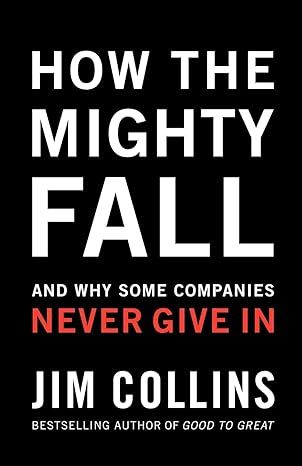How The Mighty FallAudiobook
4.6
-
1,081 ratings
Decline can be avoided. Decline can be detected. Decline can be reversed.
Amidst the desolate landscape of fallen great companies, Jim Collins began to wonder: How do the mighty fall? Can decline be detected early and avoided? How far can a company fall before the path toward doom becomes inevitable and unshakable? How can companies reverse course?
In How the Mighty Fall, Collins confronts these questions, offering leaders the well-founded hope that they can learn how to stave off decline and, if they find themselves falling, reverse their course. Collins' research project—more than four years in duration—uncovered five step-wise stages of decline:
Stage 1: Hubris Born of Success
Stage 2: Undisciplined Pursuit of More
Stage 3: Denial of Risk and Peril
Stage 4: Grasping for Salvation
Stage 5: Capitulation to Irrelevance or Death
By understanding these stages of decline, leaders can substantially reduce their chances of falling all the way to the bottom. Great companies can stumble, badly, and recover.
Every institution, no matter how great, is vulnerable to decline. There is no law of nature that the most powerful will inevitably remain at the top. Anyone can fall and most eventually do. But, as Collins' research emphasizes, some companies do indeed recover—in some cases, coming back even stronger—even after having crashed into the depths of Stage 4.
Decline, it turns out, is largely self-inflicted, and the path to recovery lies largely within our own hands. We are not imprisoned by our circumstances, our history, or even our staggering defeats along the way. As long as we never get entirely knocked out of the game, hope always remains. The mighty can fall, but they can often rise again.
Read more
Kindle
$12.99
Available instantly
Audiobook
$0.99
with membership trial
Hardcover
$25.16
Paperback
$11.51
Ships from
Amazon.com
Payment
Secure transaction
ISBN-10
0977326411
ISBN-13
978-0977326419
Print length
244 pages
Language
English
Publisher
JimCollins
Publication date
May 18, 2009
Dimensions
5.43 x 1.02 x 8.03 inches
Item weight
10.6 ounces
Product details
ASIN :
B00DXYT8Q2
File size :
2850 KB
Text-to-speech :
Enabled
Screen reader :
Supported
Enhanced typesetting :
Enabled
X-Ray :
Enabled
Word wise :
Enabled
Editorial reviews
From the Back Cover
"Whether you prevail or fail, endure or die, depends more on what you do to yourself than on what the world does to you."—Jim Collins
Decline can be avoided. Decline can be detected. Decline can be reversed.
Amid the desolate landscape of fallen great companies, Jim Collins began to wonder: How do the mighty fall? Can decline be detected early and avoided? How far can a company fall before the path toward doom becomes inevitable and unshakable? How can companies reverse course?
In How the Mighty Fall, Collins confronts these questions, offering leaders the well-founded hope that they can learn how to stave off decline and, if they find themselves falling, reverse their course.
By understanding the stages of decline, leaders can substantially reduce their chances of falling all the way to the bottom. As Collins' research emphasizes, some companies do indeed recover—in some cases, coming back even stronger. As long as you never get entirely knocked out of the game, hope always remains. The mighty can fall, but they can often rise again.
About the Author
Jim Collins is a student and teacher of what makes great companies tick, and a Socratic advisor to leaders in the business and social sectors. Having invested more than a quarter-century in rigorous research, he has authored or coauthored six books that have sold in total more than 10 million copies worldwide. They include Good to Great, Built to Last, How the Mighty Fall, and Great by Choice.
Driven by a relentless curiosity, Jim began his research and teaching career on the faculty at the Stanford Graduate School of Business, where he received the Distinguished Teaching Award in 1992. In 1995, he founded a management laboratory in Boulder, Colorado.
In addition to his work in the business sector, Jim has a passion for learning and teaching in the social sectors, including education, healthcare, government, faith-based organizations, social ventures, and cause-driven nonprofits.
In 2012 and 2013, he had the honor to serve a two-year appointment as the Class of 1951 Chair for the Study of Leadership at the United States Military Academy at West Point. In 2017, Forbes selected Jim as one of the 100 Greatest Living Business Minds.
Jim has been an avid rock climber for more than forty years and has completed single-day ascents of El Capitan and Half Dome in Yosemite Valley.
Learn more about Jim and his concepts at his website, where you’ll find articles, videos, and useful tools. jimcollins.com
Read more
About the authors
Jim Collins
Jim Collins is a student and teacher of what makes great companies tick, and a Socratic advisor to leaders in the business and social sectors. Having invested more than a quarter century in rigorous research, he has authored or coauthored a series of books that have sold in total more than 10 million copies worldwide. They include Good to Great, the #1 bestseller, which examines why some companies make the leap and others don’t; the enduring classic Built to Last, which discovers why some companies remain visionary for generations; How the Mighty Fall, which delves into how once-great companies can self-destruct; and Great by Choice, which uncovers the leadership behaviors for thriving in chaos and uncertainty. Jim has also published two monographs that extend the ideas in his primary books: Good to Great and the Social Sectors and Turning the Flywheel.
His most recent publication is BE 2.0 (Beyond Entrepreneurship 2.0), an ambitious upgrade of his very first book; it returns Jim to his original focus on small, entrepreneurial companies and honors his coauthor and mentor Bill Lazier.
Driven by a relentless curiosity, Jim began his research and teaching career on the faculty at the Stanford Graduate School of Business, where he received the Distinguished Teaching Award in 1992. In 1995, he founded a management laboratory in Boulder, Colorado, where he conducts research and engages with CEOs and senior-leadership teams.
In addition to his work in the business sector, Jim has a passion for learning and teaching in the social sectors, including education, healthcare, government, faith-based organizations, social ventures, and cause-driven nonprofits. In 2012 and 2013, he had the honor to serve a two-year appointment as the Class of 1951 Chair for the Study of Leadership at the United States Military Academy at West Point.
Jim holds a bachelor's degree in mathematical sciences and an MBA from Stanford University, and honorary doctoral degrees from the University of Colorado and the Peter F. Drucker Graduate School of Management at Claremont Graduate University. In 2017, Forbes selected Jim as one of the 100 Greatest Living Business Minds.
Read more
Reviews
Customer reviews
4.6 out of 5
1,081 global ratings
Thomas V. Morris
5
Well done
Reviewed in the United States on May 22, 2024
Verified Purchase
Collins always does a good job. I never agree on all things but his books are well researched and written.
Joshua Reich
5
Every leader should read this
Reviewed in the United States on May 20, 2011
Verified Purchase
On the plane ride back from Seattle the other day, I read Jim Collins latest book How the Mighty Fall. I've always been a huge fan of his work and this one is no different. While all his stuff is written for businesses, there are a ton of applications for churches.
In this book, Collins seeks to answer what leaders, companies and churches can learn from the failure of others. Is there a time that you can see a company is about to fail? Is there a path they all take? How do you know when a company/church full of energy, innovation and momentum, is there a time you know they are on the road to falling? Are there clearly distinguishable stages of decline? If so, can you spot the decline early? Are there telltale markers? Can you reverse decline, and if so, how? Is there a point of no return?
The reality is that according to Collins, "There are more ways to fall than to become great."
History shows that churches go through phases of this like companies do. The largest churches 50 years ago, many of them don't exist anymore or are no longer the largest, most effective churches. What happened? For many of those churches, the same as the companies that Collins talks about. They had no succession plan for leadership, they didn't develop leaders from within, and the big one, they became complex and got away from the thing they did best.
The best example in the book of this was the difference between Best Buy and Circuit City. Circuit City was once the standard in that industry, but they diversified and got away from their primary flywheel, the thing they did best. Churches have the tendency to do this as they grow. They add ministries, all good things, but it often takes away from the thing that is their primary flywheel, the thing God is blessing the most, the thing they have been called to do. Staying focused and simple is incredibly difficult. According to Collins, one of the telltale signs of a company that fell was not complacency, but stemmed more from overreaching.
What churches do is they are effective in something, so they add to it. They think success comes from doing things instead of asking the important question of "Do we know why we are successful, effective or healthy?" Churches are guilty of holding up practices and methods instead of the principles or theology behind what makes them effective. We have to do discipleship a certain way. The music has to be _________. We have to have this ministry or that program, even though it hasn't been effective in decades. What if instead of holding on to practices that aren't effective, we look at the principles to those practices, the Biblical practices churches are commanded to embody and live those out?
As Collins points out, "The best leaders know the why behind practices and effectiveness." They are always searching for the why, followed by the how. Yet, most pastors seek the how, followed by the why.
The last thing pastors can learn is have a sense of urgency. Companies that fell often lost their sense of urgency. I meet so many pastors, and church planters that do not have a sense of urgency. We, more than CEO's should have a sense of urgency. We are talking about the gospel, heaven and hell, eternity. This should keep us awake at night. Churches should be the most urgent organizations on the planet.
Overall, as with Collins other books, high marks. Every leader should read everything he writes.
For more reviews, see[...]
Read more
10 people found this helpful
John W. Pearson
5
On the Cusp of a Precipitous Fall
Reviewed in the United States on July 27, 2009
Verified Purchase
In the early pages of this cautionary, wake-up call, Jim Collins mentions what a mentor told him about effective teaching: "don't try to come up with the right answers; focus on asking good questions." I started to count the elbow-in-the-ribs questions, but I ran out of ribs.
Some best-selling authors are one-book wonders. Not Collins. The author of Built to Last and Good to Great has delivered another barn-burner. While it builds on all of his previous work--like a good business book should--it aptly kick-starts you in the gut with not just good questions, but extraordinary insights. These are the "I-better-listen-carefully-and-not-mess-up" kind of soul-stirring questions timed perfectly for today's economic environment.
He writes, "I've come to see institutional decline like a staged disease: harder to detect but easier to cure in the early stages, easier to detect but harder to cure in the later stages. An institution can look strong on the outside but already be sick on the inside, dangerously on the cusp of a precipitous fall."
It's not a happy book--it's a must-read book. Leaders that are in it for the long haul will learn principles and best practices for preventing, detecting and reversing decline. Collins identifies five stages of decline:
- Stage 1: Hubris Born of Success
- Stage 2: Undisciplined Pursuit of More
- Stage 3: Denial of Risk and Peril
- Stage 4: Grasping for Salvation
- Stage 5: Capitulation to Irrelevance or Death
"Overreaching" is one of the symptoms of Stage 2. "When an organization grows beyond its ability to fill its key seats with the right people, it has set itself up for a fall," he warns.
So why study failures? "We do ourselves a disservice by studying only success." Collins adds that "most companies eventually fall, and we cannot deny this fact." If you're leading a company, nonprofit or church today, it's possible that your own arrogance is blocking your view of reality, but there is hope. "Organizational decline is largely self-inflicted, and recovery largely within our control."
Read more
3 people found this helpful
Kathy Askew
5
GREAT BOOK!
Reviewed in the United States on September 12, 2024
Verified Purchase
This is a great book and was very informative.

Theodore A. Rushton
5
Brilliant! A long last some basic common sense
Reviewed in the United States on December 20, 2009
Verified Purchase
Brilliant.
It's the only way to describe a book that reasserts the obvious, the basics, the human fundamentals that have not changed in at least 5,000 years. Hubris. Arrogance. Greed. Bureaucracy. The Greeks examined these topics 2,500 years ago. William Shakespeare asserted human faults lies in ourselves and not in our stars. But who listens to such common sense?
Collins is criticized by those who cite "external" factors affecting the economy instead of their own failings. Well, one fact must be accepted: Every economy is people based. People create the economy, people run it and people are its glories and faults. If it doesn't satisfy the needs of people, even the cleverest "economy" is nothing. Economists who claim to have a formula to explain the economic future are the alchemists of the modern world; the future is what people do, and that is never predictable.
"Whether you prevail or fail, endure or die, depends more on what you do to yourself than on what the world does to you," Collins writes. This infuriates conservatives because it implies they or America aren't destined by God to be No. 1. Liberals hate it because it tells them they cannot devise a formula to make everyone healthy, wealthy, wise and happy Democratic voters.
"We are doing God's work," said Lloyd Blankfein, chief executive of Goldman Sachs. God was not pleased, so Goldman Sachs got its $10 billion bailout from taxpayers. Even the Son of God didn't think money changers are that good or well connected; He tossed them out of the temple.
The fact Collins stresses most is customer service. He cites various cases of companies ignoring this rule and subsequently failing. Motorola is an example; my trying to trying to deal helpfully with Motorola was an exercise in futility. Motorola thought customers existed to make Motorola rich. Collins deftly points out how this led to Motorla's collapse.
Business people who fail to heed this book will fail; those who do understand it may have a lot more to learn, but at least they understand the basics. Buy a copy for your favourite chief executive, and give it with the reminder: There Will Be a Test With One Answer.
The only answer that matters is the success or failure of the business.
Read more
Top Jim Collins titles
View all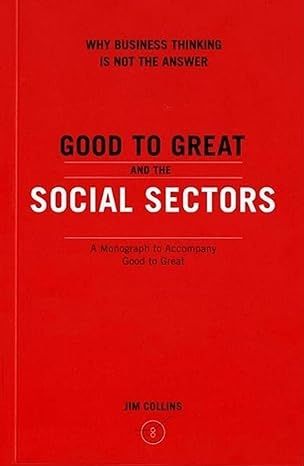
Good to Great and the Social Sectors: A Monograph to Accompany Good to Great (Good to Great, 3)
4.5
-
1,474
$6.00
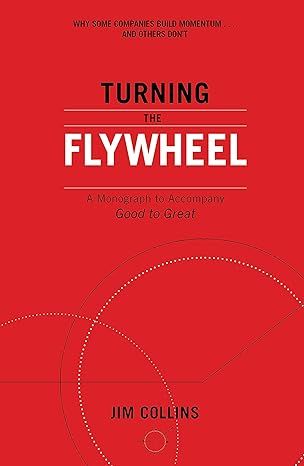
Turning the Flywheel: A Monograph to Accompany Good to Great
4.6
-
1,230
$0.99
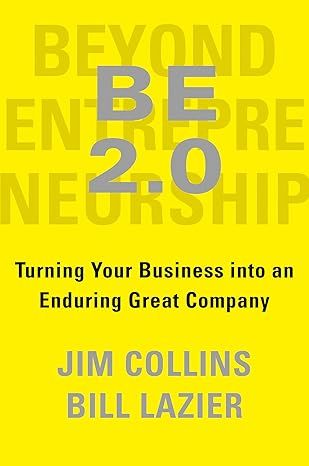
BE 2.0 (Beyond Entrepreneurship 2.0): Turning Your Business into an Enduring Great Company
4.8
-
803
$0.99
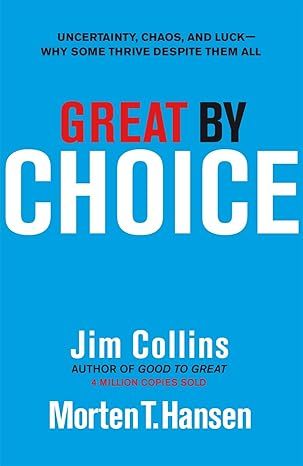
Great by Choice: Uncertainty, Chaos and Luck - Why Some Thrive Despite Them All
4.6
-
1,765
$0.99
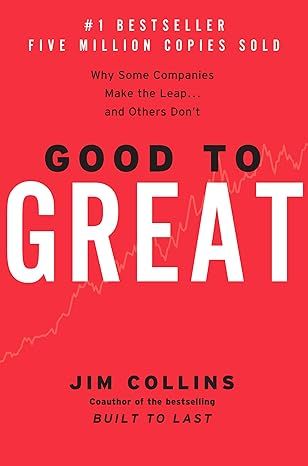
Good to Great: Why Some Companies Make the Leap...And Others Don't (Good to Great, 1)
4.5
-
9,099
$0.99
Best Sellers
View all
The Tuscan Child
4.2
-
100,022
$8.39

The Thursday Murder Club: A Novel (A Thursday Murder Club Mystery)
4.3
-
155,575
$6.33

Sapiens: A Brief History of Humankind
4.6
-
140,302
$13.49

The Butterfly Garden (The Collector, 1)
4.3
-
88,556
$9.59

Things We Hide from the Light (Knockemout Series, 2)
4.4
-
94,890
$11.66

The Last Thing He Told Me: A Novel
4.3
-
154,085
$2.99

The Perfect Marriage: A Completely Gripping Psychological Suspense
4.3
-
143,196
$9.47

The Coworker
4.1
-
80,003
$13.48

First Lie Wins: A Novel (Random House Large Print)
4.3
-
54,062
$14.99

Mile High (Windy City Series Book 1)
4.4
-
59,745
$16.19

Layla
4.2
-
107,613
$8.99

The Locked Door
4.4
-
94,673
$8.53
